Social Work Skills: Analyzing Intervention Methods in Case Studies
VerifiedAdded on 2023/06/11
|8
|1896
|433
Case Study
AI Summary
This assignment delves into various social work intervention methods through case study analysis. Task 1 explores group work and family group conferencing in a family facing domestic violence and substance abuse issues. Task 2 critically evaluates counseling and family therapy for a woman battling painkiller addiction and relapses, emphasizing the importance of emotional support and family involvement. Task 3 analyzes task-centered social work and crisis intervention in addressing behavioral issues in a child affected by his father's incarceration, highlighting the need for immediate support and structured goal-setting. The report concludes that a multifaceted approach, tailored to specific circumstances, is crucial for effective social work intervention, with the website providing access to more resources on this topic.
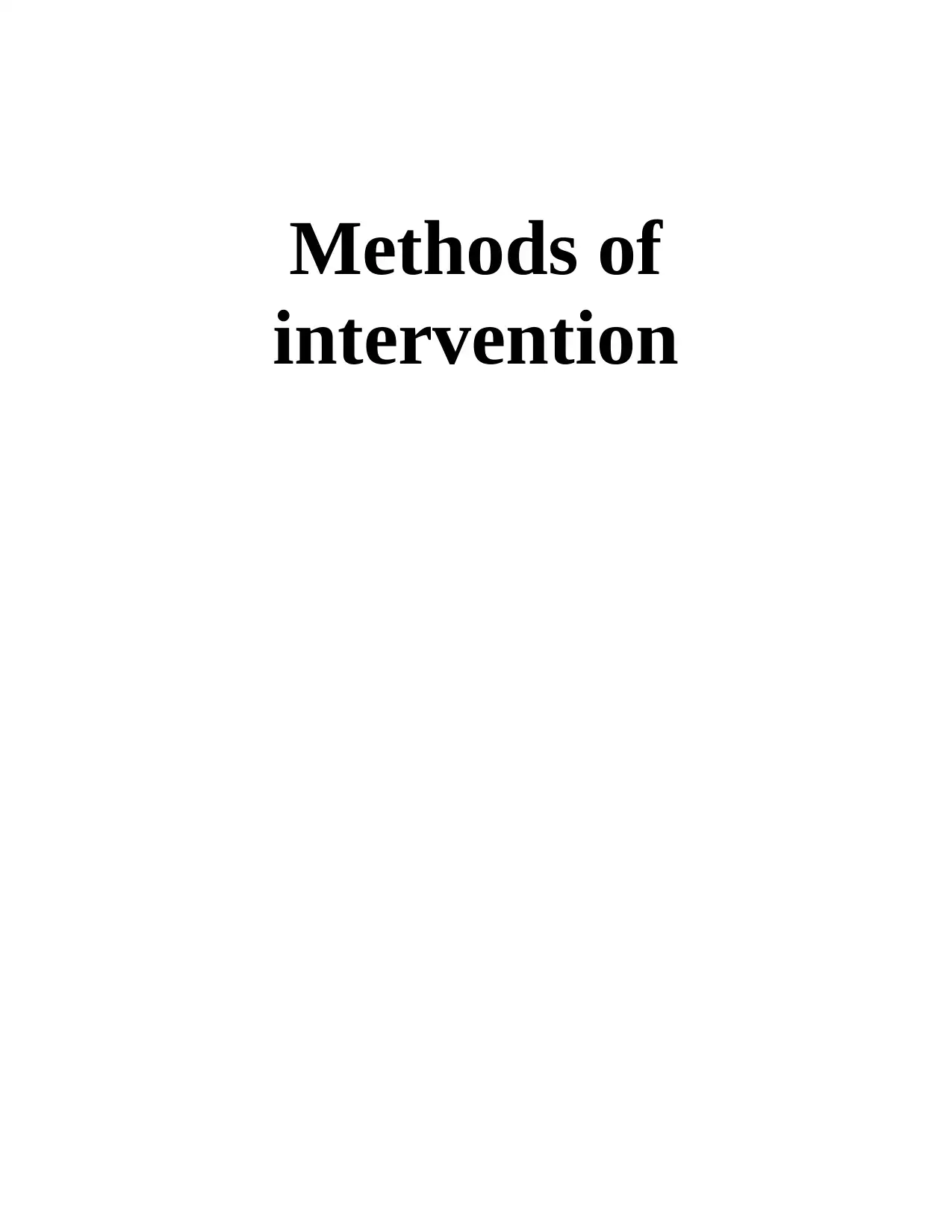
Methods of
intervention
intervention
Paraphrase This Document
Need a fresh take? Get an instant paraphrase of this document with our AI Paraphraser

Contents
Task 1..............................................................................................................................................3
INTRODUCTION..........................................................................................................................3
MAIN BODY..................................................................................................................................3
CONCLUSION..............................................................................................................................4
TASK 2............................................................................................................................................4
INTRODUCTION..........................................................................................................................4
MAIN BODY..................................................................................................................................4
CONCLUSION..............................................................................................................................5
TASK 3............................................................................................................................................6
INTRODUCTION..........................................................................................................................6
MAIN BODY..................................................................................................................................6
CONCLUSION..............................................................................................................................7
REFERENCES...............................................................................................................................8
Task 1..............................................................................................................................................3
INTRODUCTION..........................................................................................................................3
MAIN BODY..................................................................................................................................3
CONCLUSION..............................................................................................................................4
TASK 2............................................................................................................................................4
INTRODUCTION..........................................................................................................................4
MAIN BODY..................................................................................................................................4
CONCLUSION..............................................................................................................................5
TASK 3............................................................................................................................................6
INTRODUCTION..........................................................................................................................6
MAIN BODY..................................................................................................................................6
CONCLUSION..............................................................................................................................7
REFERENCES...............................................................................................................................8
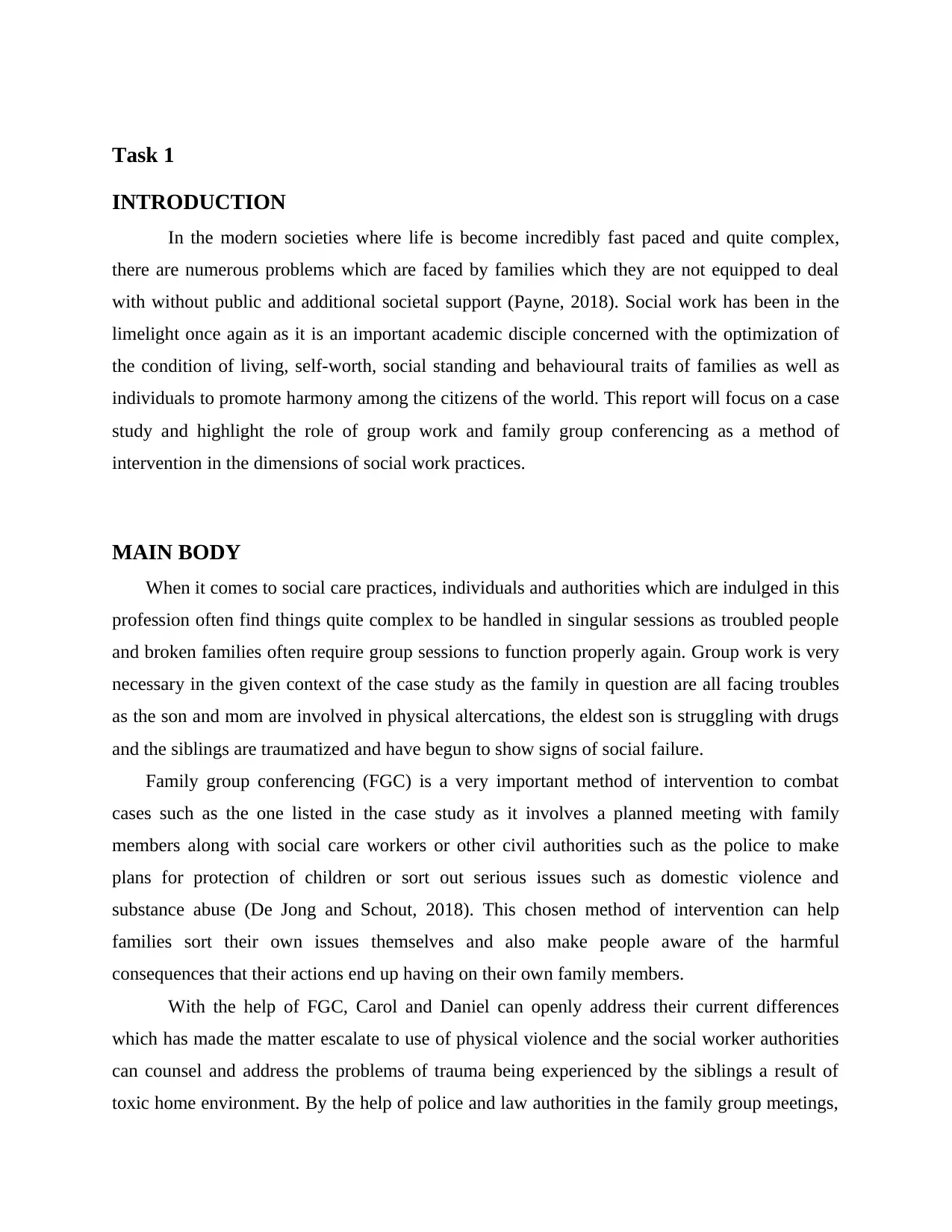
Task 1
INTRODUCTION
In the modern societies where life is become incredibly fast paced and quite complex,
there are numerous problems which are faced by families which they are not equipped to deal
with without public and additional societal support (Payne, 2018). Social work has been in the
limelight once again as it is an important academic disciple concerned with the optimization of
the condition of living, self-worth, social standing and behavioural traits of families as well as
individuals to promote harmony among the citizens of the world. This report will focus on a case
study and highlight the role of group work and family group conferencing as a method of
intervention in the dimensions of social work practices.
MAIN BODY
When it comes to social care practices, individuals and authorities which are indulged in this
profession often find things quite complex to be handled in singular sessions as troubled people
and broken families often require group sessions to function properly again. Group work is very
necessary in the given context of the case study as the family in question are all facing troubles
as the son and mom are involved in physical altercations, the eldest son is struggling with drugs
and the siblings are traumatized and have begun to show signs of social failure.
Family group conferencing (FGC) is a very important method of intervention to combat
cases such as the one listed in the case study as it involves a planned meeting with family
members along with social care workers or other civil authorities such as the police to make
plans for protection of children or sort out serious issues such as domestic violence and
substance abuse (De Jong and Schout, 2018). This chosen method of intervention can help
families sort their own issues themselves and also make people aware of the harmful
consequences that their actions end up having on their own family members.
With the help of FGC, Carol and Daniel can openly address their current differences
which has made the matter escalate to use of physical violence and the social worker authorities
can counsel and address the problems of trauma being experienced by the siblings a result of
toxic home environment. By the help of police and law authorities in the family group meetings,
INTRODUCTION
In the modern societies where life is become incredibly fast paced and quite complex,
there are numerous problems which are faced by families which they are not equipped to deal
with without public and additional societal support (Payne, 2018). Social work has been in the
limelight once again as it is an important academic disciple concerned with the optimization of
the condition of living, self-worth, social standing and behavioural traits of families as well as
individuals to promote harmony among the citizens of the world. This report will focus on a case
study and highlight the role of group work and family group conferencing as a method of
intervention in the dimensions of social work practices.
MAIN BODY
When it comes to social care practices, individuals and authorities which are indulged in this
profession often find things quite complex to be handled in singular sessions as troubled people
and broken families often require group sessions to function properly again. Group work is very
necessary in the given context of the case study as the family in question are all facing troubles
as the son and mom are involved in physical altercations, the eldest son is struggling with drugs
and the siblings are traumatized and have begun to show signs of social failure.
Family group conferencing (FGC) is a very important method of intervention to combat
cases such as the one listed in the case study as it involves a planned meeting with family
members along with social care workers or other civil authorities such as the police to make
plans for protection of children or sort out serious issues such as domestic violence and
substance abuse (De Jong and Schout, 2018). This chosen method of intervention can help
families sort their own issues themselves and also make people aware of the harmful
consequences that their actions end up having on their own family members.
With the help of FGC, Carol and Daniel can openly address their current differences
which has made the matter escalate to use of physical violence and the social worker authorities
can counsel and address the problems of trauma being experienced by the siblings a result of
toxic home environment. By the help of police and law authorities in the family group meetings,
⊘ This is a preview!⊘
Do you want full access?
Subscribe today to unlock all pages.

Trusted by 1+ million students worldwide
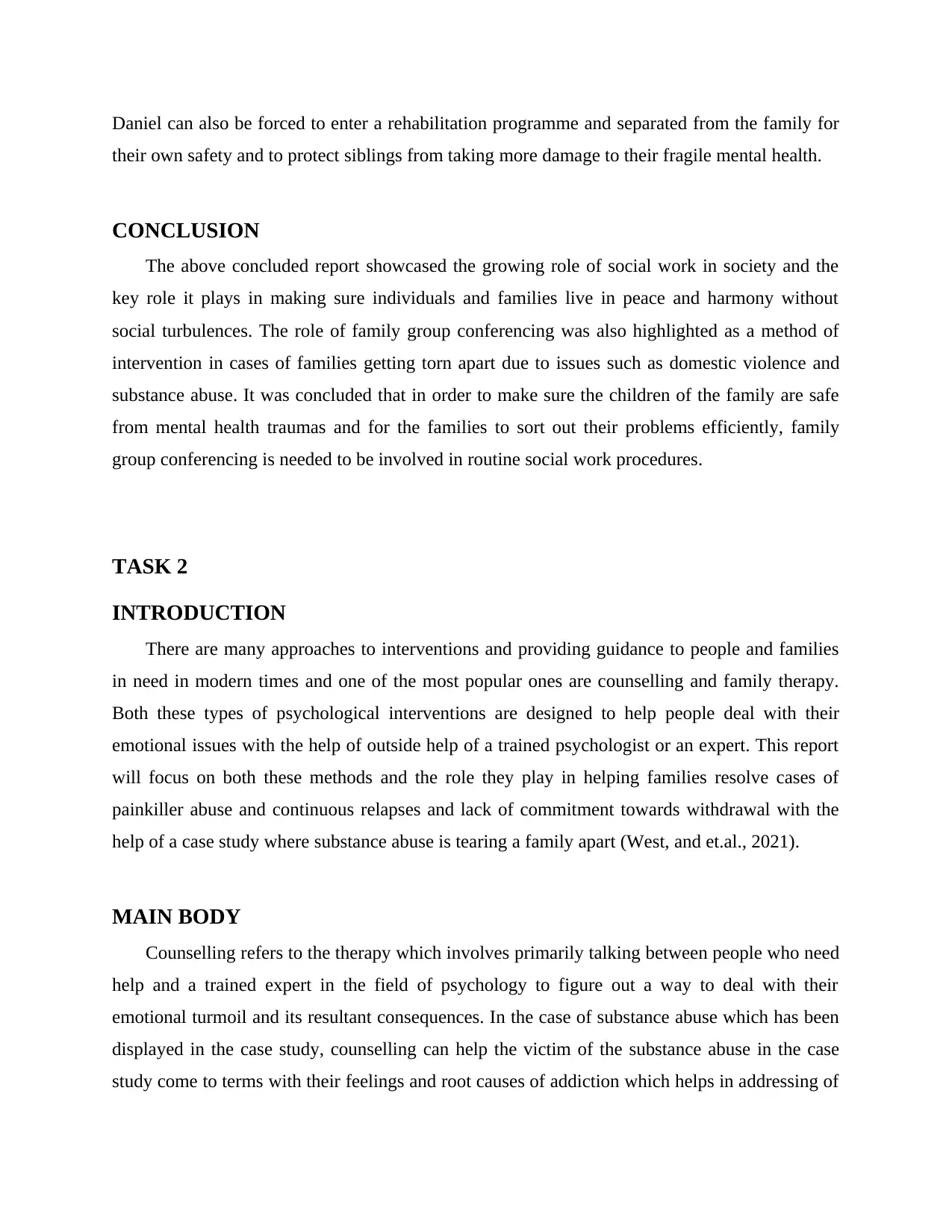
Daniel can also be forced to enter a rehabilitation programme and separated from the family for
their own safety and to protect siblings from taking more damage to their fragile mental health.
CONCLUSION
The above concluded report showcased the growing role of social work in society and the
key role it plays in making sure individuals and families live in peace and harmony without
social turbulences. The role of family group conferencing was also highlighted as a method of
intervention in cases of families getting torn apart due to issues such as domestic violence and
substance abuse. It was concluded that in order to make sure the children of the family are safe
from mental health traumas and for the families to sort out their problems efficiently, family
group conferencing is needed to be involved in routine social work procedures.
TASK 2
INTRODUCTION
There are many approaches to interventions and providing guidance to people and families
in need in modern times and one of the most popular ones are counselling and family therapy.
Both these types of psychological interventions are designed to help people deal with their
emotional issues with the help of outside help of a trained psychologist or an expert. This report
will focus on both these methods and the role they play in helping families resolve cases of
painkiller abuse and continuous relapses and lack of commitment towards withdrawal with the
help of a case study where substance abuse is tearing a family apart (West, and et.al., 2021).
MAIN BODY
Counselling refers to the therapy which involves primarily talking between people who need
help and a trained expert in the field of psychology to figure out a way to deal with their
emotional turmoil and its resultant consequences. In the case of substance abuse which has been
displayed in the case study, counselling can help the victim of the substance abuse in the case
study come to terms with their feelings and root causes of addiction which helps in addressing of
their own safety and to protect siblings from taking more damage to their fragile mental health.
CONCLUSION
The above concluded report showcased the growing role of social work in society and the
key role it plays in making sure individuals and families live in peace and harmony without
social turbulences. The role of family group conferencing was also highlighted as a method of
intervention in cases of families getting torn apart due to issues such as domestic violence and
substance abuse. It was concluded that in order to make sure the children of the family are safe
from mental health traumas and for the families to sort out their problems efficiently, family
group conferencing is needed to be involved in routine social work procedures.
TASK 2
INTRODUCTION
There are many approaches to interventions and providing guidance to people and families
in need in modern times and one of the most popular ones are counselling and family therapy.
Both these types of psychological interventions are designed to help people deal with their
emotional issues with the help of outside help of a trained psychologist or an expert. This report
will focus on both these methods and the role they play in helping families resolve cases of
painkiller abuse and continuous relapses and lack of commitment towards withdrawal with the
help of a case study where substance abuse is tearing a family apart (West, and et.al., 2021).
MAIN BODY
Counselling refers to the therapy which involves primarily talking between people who need
help and a trained expert in the field of psychology to figure out a way to deal with their
emotional turmoil and its resultant consequences. In the case of substance abuse which has been
displayed in the case study, counselling can help the victim of the substance abuse in the case
study come to terms with their feelings and root causes of addiction which helps in addressing of
Paraphrase This Document
Need a fresh take? Get an instant paraphrase of this document with our AI Paraphraser
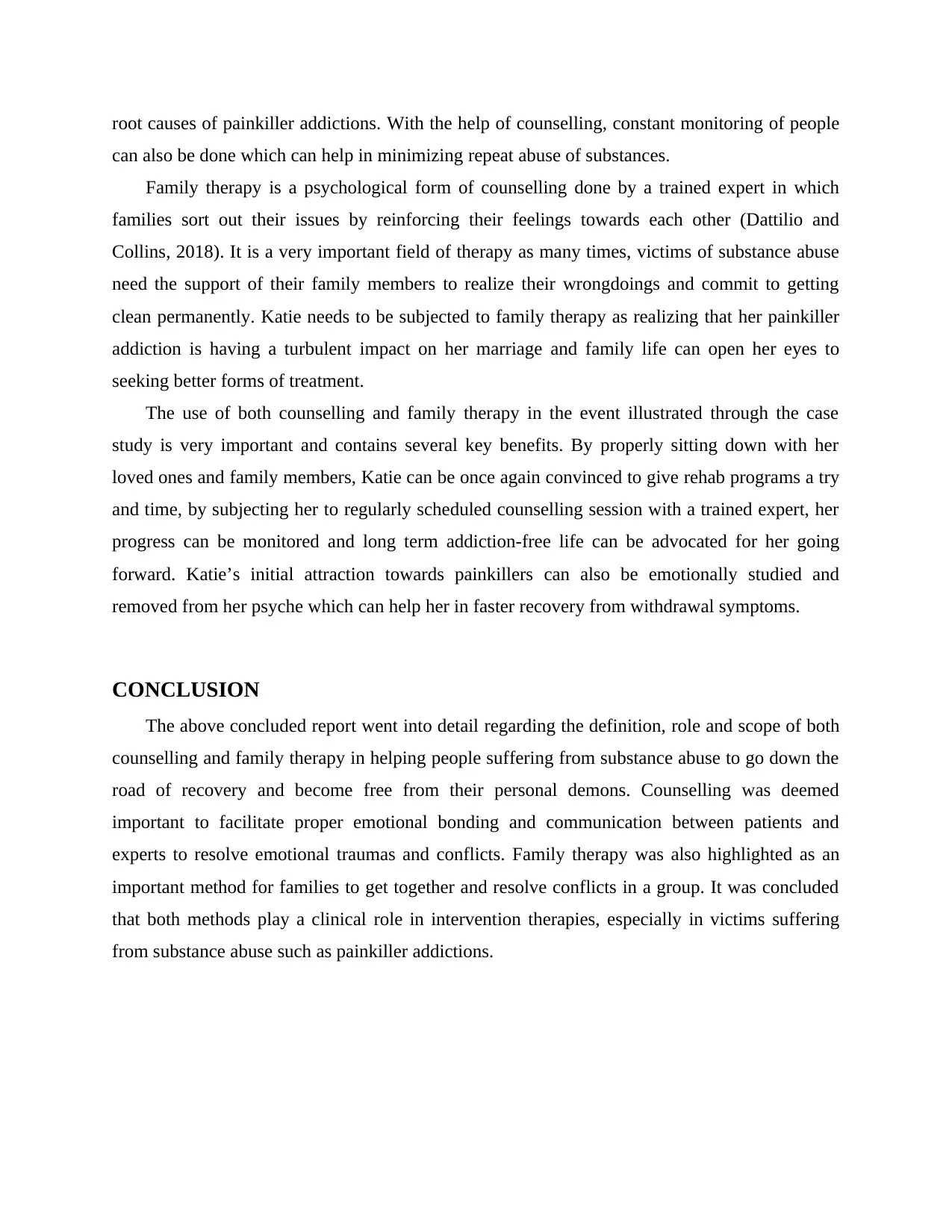
root causes of painkiller addictions. With the help of counselling, constant monitoring of people
can also be done which can help in minimizing repeat abuse of substances.
Family therapy is a psychological form of counselling done by a trained expert in which
families sort out their issues by reinforcing their feelings towards each other (Dattilio and
Collins, 2018). It is a very important field of therapy as many times, victims of substance abuse
need the support of their family members to realize their wrongdoings and commit to getting
clean permanently. Katie needs to be subjected to family therapy as realizing that her painkiller
addiction is having a turbulent impact on her marriage and family life can open her eyes to
seeking better forms of treatment.
The use of both counselling and family therapy in the event illustrated through the case
study is very important and contains several key benefits. By properly sitting down with her
loved ones and family members, Katie can be once again convinced to give rehab programs a try
and time, by subjecting her to regularly scheduled counselling session with a trained expert, her
progress can be monitored and long term addiction-free life can be advocated for her going
forward. Katie’s initial attraction towards painkillers can also be emotionally studied and
removed from her psyche which can help her in faster recovery from withdrawal symptoms.
CONCLUSION
The above concluded report went into detail regarding the definition, role and scope of both
counselling and family therapy in helping people suffering from substance abuse to go down the
road of recovery and become free from their personal demons. Counselling was deemed
important to facilitate proper emotional bonding and communication between patients and
experts to resolve emotional traumas and conflicts. Family therapy was also highlighted as an
important method for families to get together and resolve conflicts in a group. It was concluded
that both methods play a clinical role in intervention therapies, especially in victims suffering
from substance abuse such as painkiller addictions.
can also be done which can help in minimizing repeat abuse of substances.
Family therapy is a psychological form of counselling done by a trained expert in which
families sort out their issues by reinforcing their feelings towards each other (Dattilio and
Collins, 2018). It is a very important field of therapy as many times, victims of substance abuse
need the support of their family members to realize their wrongdoings and commit to getting
clean permanently. Katie needs to be subjected to family therapy as realizing that her painkiller
addiction is having a turbulent impact on her marriage and family life can open her eyes to
seeking better forms of treatment.
The use of both counselling and family therapy in the event illustrated through the case
study is very important and contains several key benefits. By properly sitting down with her
loved ones and family members, Katie can be once again convinced to give rehab programs a try
and time, by subjecting her to regularly scheduled counselling session with a trained expert, her
progress can be monitored and long term addiction-free life can be advocated for her going
forward. Katie’s initial attraction towards painkillers can also be emotionally studied and
removed from her psyche which can help her in faster recovery from withdrawal symptoms.
CONCLUSION
The above concluded report went into detail regarding the definition, role and scope of both
counselling and family therapy in helping people suffering from substance abuse to go down the
road of recovery and become free from their personal demons. Counselling was deemed
important to facilitate proper emotional bonding and communication between patients and
experts to resolve emotional traumas and conflicts. Family therapy was also highlighted as an
important method for families to get together and resolve conflicts in a group. It was concluded
that both methods play a clinical role in intervention therapies, especially in victims suffering
from substance abuse such as painkiller addictions.
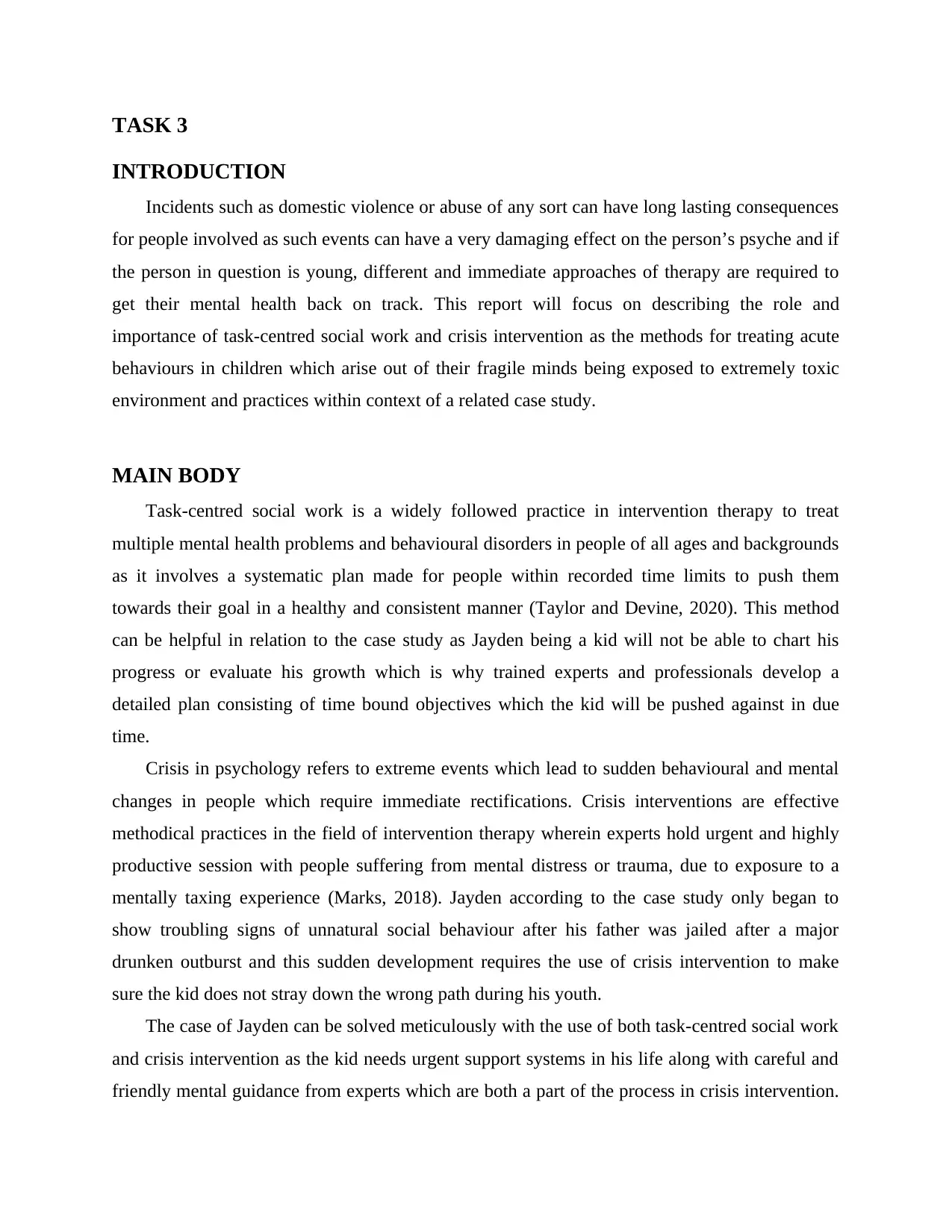
TASK 3
INTRODUCTION
Incidents such as domestic violence or abuse of any sort can have long lasting consequences
for people involved as such events can have a very damaging effect on the person’s psyche and if
the person in question is young, different and immediate approaches of therapy are required to
get their mental health back on track. This report will focus on describing the role and
importance of task-centred social work and crisis intervention as the methods for treating acute
behaviours in children which arise out of their fragile minds being exposed to extremely toxic
environment and practices within context of a related case study.
MAIN BODY
Task-centred social work is a widely followed practice in intervention therapy to treat
multiple mental health problems and behavioural disorders in people of all ages and backgrounds
as it involves a systematic plan made for people within recorded time limits to push them
towards their goal in a healthy and consistent manner (Taylor and Devine, 2020). This method
can be helpful in relation to the case study as Jayden being a kid will not be able to chart his
progress or evaluate his growth which is why trained experts and professionals develop a
detailed plan consisting of time bound objectives which the kid will be pushed against in due
time.
Crisis in psychology refers to extreme events which lead to sudden behavioural and mental
changes in people which require immediate rectifications. Crisis interventions are effective
methodical practices in the field of intervention therapy wherein experts hold urgent and highly
productive session with people suffering from mental distress or trauma, due to exposure to a
mentally taxing experience (Marks, 2018). Jayden according to the case study only began to
show troubling signs of unnatural social behaviour after his father was jailed after a major
drunken outburst and this sudden development requires the use of crisis intervention to make
sure the kid does not stray down the wrong path during his youth.
The case of Jayden can be solved meticulously with the use of both task-centred social work
and crisis intervention as the kid needs urgent support systems in his life along with careful and
friendly mental guidance from experts which are both a part of the process in crisis intervention.
INTRODUCTION
Incidents such as domestic violence or abuse of any sort can have long lasting consequences
for people involved as such events can have a very damaging effect on the person’s psyche and if
the person in question is young, different and immediate approaches of therapy are required to
get their mental health back on track. This report will focus on describing the role and
importance of task-centred social work and crisis intervention as the methods for treating acute
behaviours in children which arise out of their fragile minds being exposed to extremely toxic
environment and practices within context of a related case study.
MAIN BODY
Task-centred social work is a widely followed practice in intervention therapy to treat
multiple mental health problems and behavioural disorders in people of all ages and backgrounds
as it involves a systematic plan made for people within recorded time limits to push them
towards their goal in a healthy and consistent manner (Taylor and Devine, 2020). This method
can be helpful in relation to the case study as Jayden being a kid will not be able to chart his
progress or evaluate his growth which is why trained experts and professionals develop a
detailed plan consisting of time bound objectives which the kid will be pushed against in due
time.
Crisis in psychology refers to extreme events which lead to sudden behavioural and mental
changes in people which require immediate rectifications. Crisis interventions are effective
methodical practices in the field of intervention therapy wherein experts hold urgent and highly
productive session with people suffering from mental distress or trauma, due to exposure to a
mentally taxing experience (Marks, 2018). Jayden according to the case study only began to
show troubling signs of unnatural social behaviour after his father was jailed after a major
drunken outburst and this sudden development requires the use of crisis intervention to make
sure the kid does not stray down the wrong path during his youth.
The case of Jayden can be solved meticulously with the use of both task-centred social work
and crisis intervention as the kid needs urgent support systems in his life along with careful and
friendly mental guidance from experts which are both a part of the process in crisis intervention.
⊘ This is a preview!⊘
Do you want full access?
Subscribe today to unlock all pages.

Trusted by 1+ million students worldwide
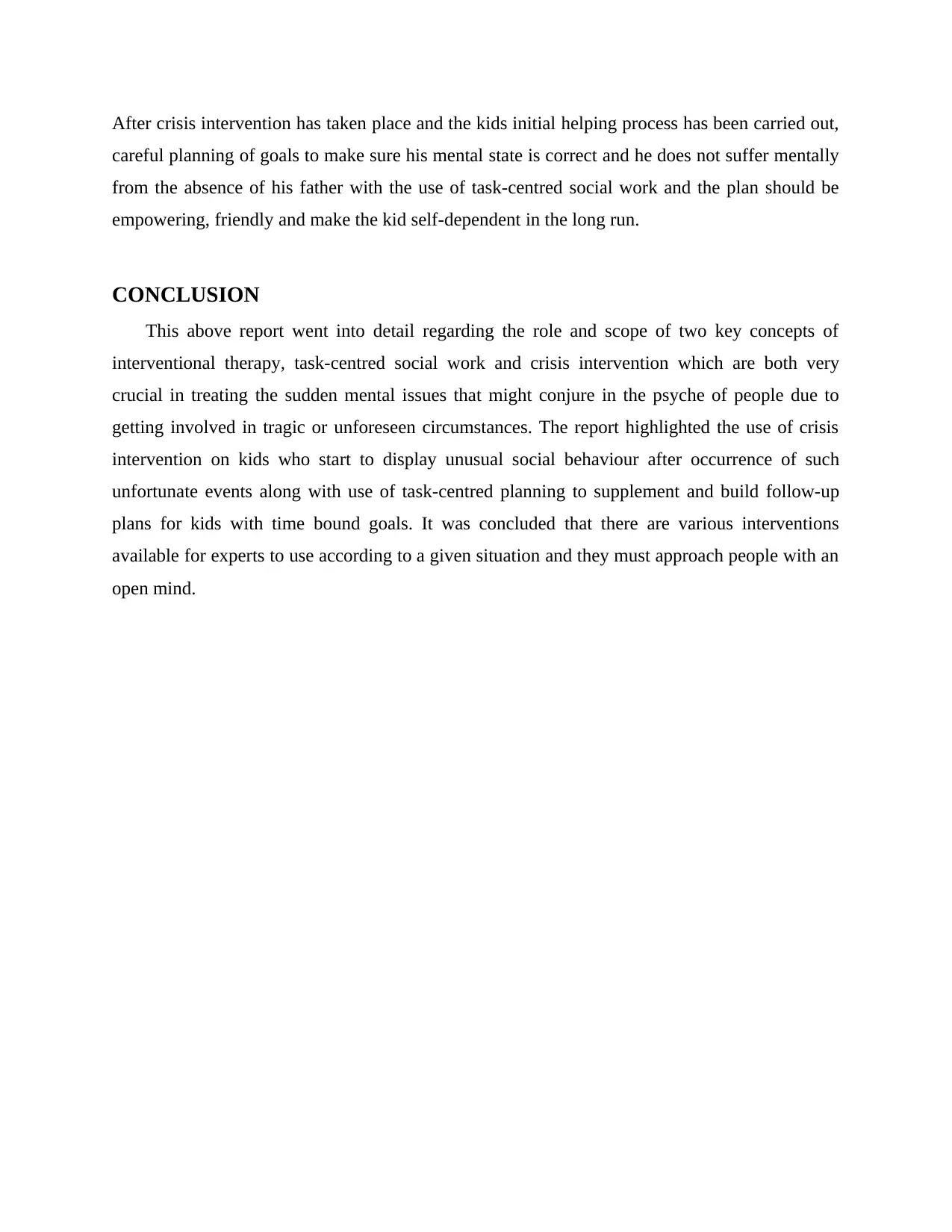
After crisis intervention has taken place and the kids initial helping process has been carried out,
careful planning of goals to make sure his mental state is correct and he does not suffer mentally
from the absence of his father with the use of task-centred social work and the plan should be
empowering, friendly and make the kid self-dependent in the long run.
CONCLUSION
This above report went into detail regarding the role and scope of two key concepts of
interventional therapy, task-centred social work and crisis intervention which are both very
crucial in treating the sudden mental issues that might conjure in the psyche of people due to
getting involved in tragic or unforeseen circumstances. The report highlighted the use of crisis
intervention on kids who start to display unusual social behaviour after occurrence of such
unfortunate events along with use of task-centred planning to supplement and build follow-up
plans for kids with time bound goals. It was concluded that there are various interventions
available for experts to use according to a given situation and they must approach people with an
open mind.
careful planning of goals to make sure his mental state is correct and he does not suffer mentally
from the absence of his father with the use of task-centred social work and the plan should be
empowering, friendly and make the kid self-dependent in the long run.
CONCLUSION
This above report went into detail regarding the role and scope of two key concepts of
interventional therapy, task-centred social work and crisis intervention which are both very
crucial in treating the sudden mental issues that might conjure in the psyche of people due to
getting involved in tragic or unforeseen circumstances. The report highlighted the use of crisis
intervention on kids who start to display unusual social behaviour after occurrence of such
unfortunate events along with use of task-centred planning to supplement and build follow-up
plans for kids with time bound goals. It was concluded that there are various interventions
available for experts to use according to a given situation and they must approach people with an
open mind.
Paraphrase This Document
Need a fresh take? Get an instant paraphrase of this document with our AI Paraphraser
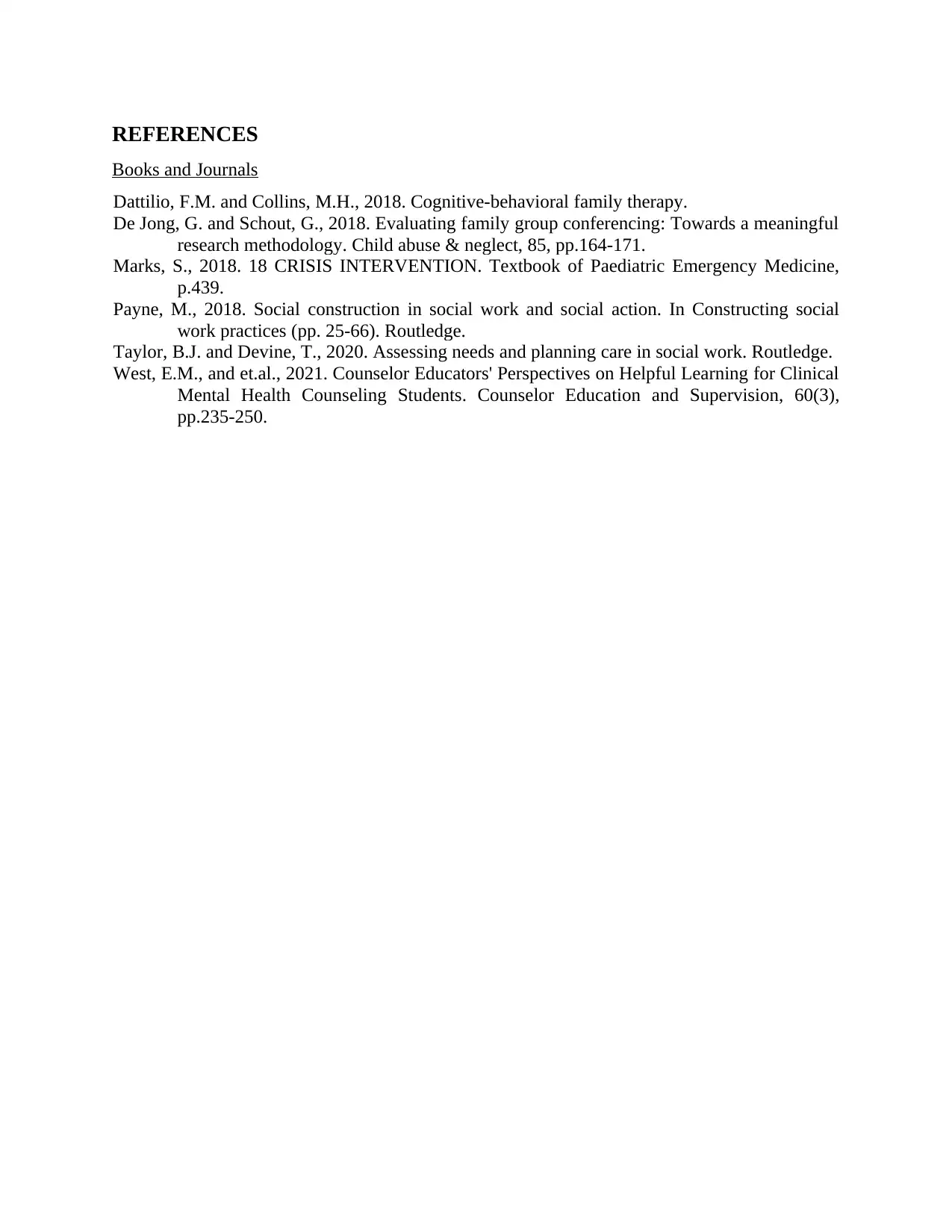
REFERENCES
Books and Journals
Dattilio, F.M. and Collins, M.H., 2018. Cognitive-behavioral family therapy.
De Jong, G. and Schout, G., 2018. Evaluating family group conferencing: Towards a meaningful
research methodology. Child abuse & neglect, 85, pp.164-171.
Marks, S., 2018. 18 CRISIS INTERVENTION. Textbook of Paediatric Emergency Medicine,
p.439.
Payne, M., 2018. Social construction in social work and social action. In Constructing social
work practices (pp. 25-66). Routledge.
Taylor, B.J. and Devine, T., 2020. Assessing needs and planning care in social work. Routledge.
West, E.M., and et.al., 2021. Counselor Educators' Perspectives on Helpful Learning for Clinical
Mental Health Counseling Students. Counselor Education and Supervision, 60(3),
pp.235-250.
Books and Journals
Dattilio, F.M. and Collins, M.H., 2018. Cognitive-behavioral family therapy.
De Jong, G. and Schout, G., 2018. Evaluating family group conferencing: Towards a meaningful
research methodology. Child abuse & neglect, 85, pp.164-171.
Marks, S., 2018. 18 CRISIS INTERVENTION. Textbook of Paediatric Emergency Medicine,
p.439.
Payne, M., 2018. Social construction in social work and social action. In Constructing social
work practices (pp. 25-66). Routledge.
Taylor, B.J. and Devine, T., 2020. Assessing needs and planning care in social work. Routledge.
West, E.M., and et.al., 2021. Counselor Educators' Perspectives on Helpful Learning for Clinical
Mental Health Counseling Students. Counselor Education and Supervision, 60(3),
pp.235-250.
1 out of 8
Your All-in-One AI-Powered Toolkit for Academic Success.
+13062052269
info@desklib.com
Available 24*7 on WhatsApp / Email
![[object Object]](/_next/static/media/star-bottom.7253800d.svg)
Unlock your academic potential
Copyright © 2020–2026 A2Z Services. All Rights Reserved. Developed and managed by ZUCOL.

